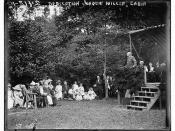A COMPARISON OF THE PEDAGOGICAL PHILOSOPHIES
OF WILLIAM VENNARD AND RICHARD MILLER
________________
A Paper
Presented to
Dr. David Robinson
School of Church Music
Southwestern Baptist Theological Seminary
Fort Worth, Texas
________________
In Partial Fulfillment
of the Requirements for the Course
Seminar in Vocal Pedagogy (VOICL 4902)
________________
by
Michael Mays
November, 2003
In many ways, a comparison of the pedagogical styles presented in the respective seminal works of William Vennard (Singing: the Mechanism and Technic) and Richard Miller (The Structure of Singing) are attempts to contrast two sides of the same coin, especially with regard to philosophical--and certainly scientific--opinions. With regard to approach, however, the comparison is more a matter of "apples and oranges." Vennard's work takes a more technical approach, taking care to explain scientific obser-vations of vocal phenomena. Miller, on the other hand, deals primarily with direct application of technique. This is not to say Vennard does not exhaustively address technique, or that Miller never addresses the science of it, but that his approach is based on first discussing the scientific body of knowledge (at the time of his writing) on vocal production, than from the standpoint of direct vocal production itself, Ã la Miller.
As Vennard's book is the older and more used text, it seems logical to treat his text as the "default" subject. Miller has not presented his work as a response per se, but in most pedagogical situations it is probable that Vennard is the given authority, with Miller used (if at all) as an ancillary source. After all, Vennard is more exhaustive with his discussions of the purely scientific aspects of vocal production within his text (even if some of his information is dated), and such knowledge is foun-dational to any technical understanding upon which to base one's pedagogy. Miller also supplies...


